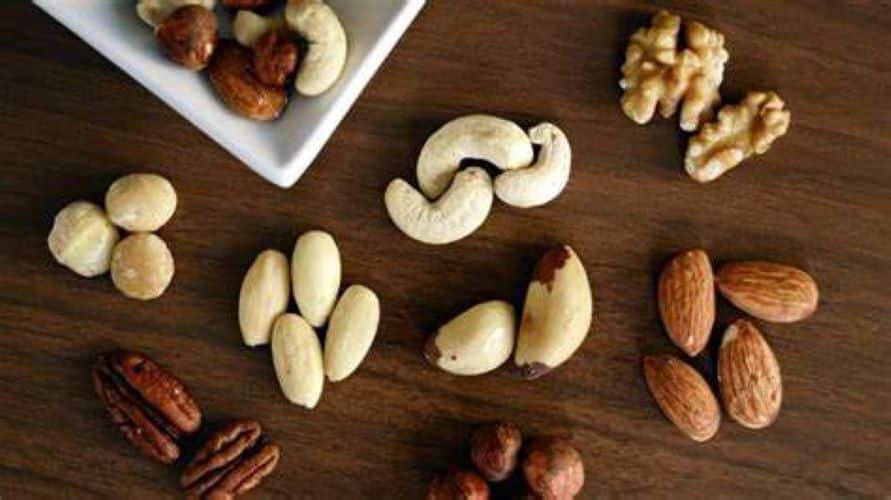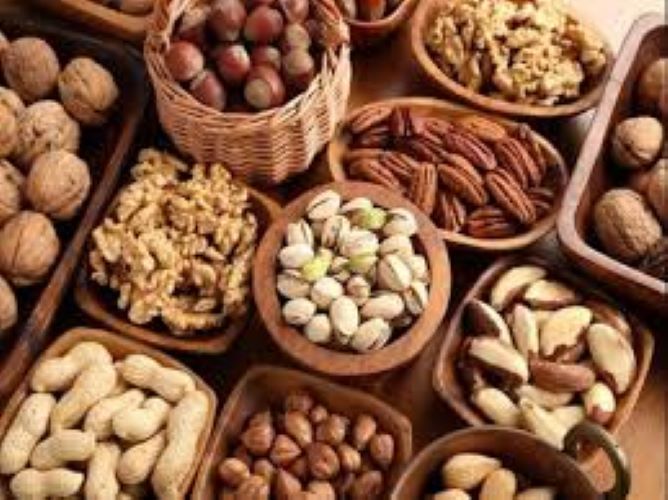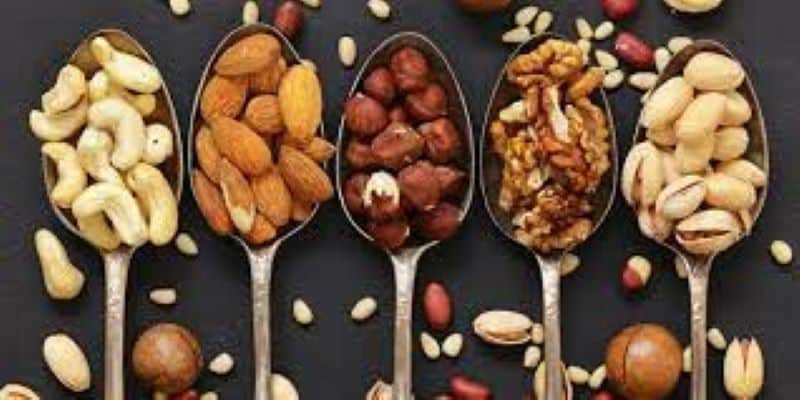Blog
10 Healthy Nuts That Are Great For Your Body

As a health nut, I eat a lot of nuts. Not only are they full of protein and other nutrients, but they’re also satisfyingly crunchy and delicious. Some nuts even have medicinal properties—which is why many cultures around the world have been using them for centuries. In this article, I’m going to introduce you to ten of my favorite healthy nuts that I like to snack on regularly.
Almonds
Almonds are a great source of protein and fiber, two nutrients that help keep you feeling full. They’re also low in fat, which is why they get a pass from the nutrition police.
Almonds are high in magnesium, which helps maintain normal blood pressure levels and regulate blood sugar levels. They’re also rich in potassium–a mineral that helps regulate heart function and lower blood pressure by keeping sodium from building up inside your body’s cells–as well as calcium and vitamin E (which protects against oxidative stress).
Nutritionists recommend eating raw almonds instead of roasted ones because roasting can increase their calorie content by as much as 15%!
Almonds are a great source of vitamin E, which is an antioxidant that helps protect your cells from damage. This makes almonds especially beneficial for people who are at risk for heart disease or diabetes.
Almonds are also rich in calcium and magnesium, two minerals that help promote bone health. One study found that eating almonds as part of a healthy diet may help prevent age-related bone loss.
Almonds are a good source of protein and fiber. They contain about 20% protein by weight, which means that one cup of almonds contains around 7 grams of protein. This makes them an especially good snack for vegetarians, who may not get enough of this essential nutrient in their diet.
Almonds are also a good source of fiber, which helps promote digestive health by making you feel full longer. One cup of almonds contains about 3 grams of fiber.
Cashews
Cashews are rich in iron, which helps your body carry oxygen to cells. Cashews also contain fiber and magnesium, which can help lower cholesterol levels and blood pressure.
Cashews are high in phosphorus, zinc and vitamin B6 (pyridoxine). Phosphorus is an essential mineral that keeps bones strong; zinc plays a role in healing wounds; while pyridoxine assists with metabolism of protein foods
and the production of red blood cells. Cashews are also a good source of protein and they contain healthy fats, particularly oleic acid (a monounsaturated fat), which lowers LDL cholesterol levels.
Cashews are a good source of magnesium, manganese and copper. Magnesium is essential for nerve and muscle function; manganese plays a role in wound healing; while copper helps form collagen and elastin in connective tissues such as tendons, ligaments and skin.
Cashews are a good source of vitamin K, which helps with blood clotting and bone health.
They also contain a good amount of phosphorus, which helps your body use fats and carbohydrates for energy. Cashews are high in copper and manganese, both essential minerals that play a role in wound healing and connective tissue formation.
Brazil nuts
Brazil nuts are one of the healthiest nuts you can eat. They’re high in selenium, which may help prevent cancer and heart disease. Selenium also helps your body maintain a healthy metabolism, along with protecting your cells from damage caused by free radicals. Brazil nuts are also rich in magnesium, which helps to relax muscles and nerves; zinc (in addition to being a good source of protein), which helps your immune system function properly; manganese–an essential trace mineral that aids in energy production; copper–an antioxidant mineral important for bone growth; iron–which transports oxygen throughout the body; plus vitamin E–an antioxidant vitamin that protects against free radical damage
and helps your body maintain a healthy heart.
Almonds are a great source of vitamin E, which is an antioxidant that helps protect against free radical damage. They’re also high in copper, an essential trace mineral that aids in energy production and iron, which transports oxygen throughout the body.
Nuts are a great way to get protein in your diet. One ounce of almonds contains 6 grams of protein and they’re also high in fiber, which helps keep you full so you don’t overeat later on.
Nuts are a great source of vitamin E, which is an antioxidant that helps protect against free radical damage. They’re also high in copper, an essential trace mineral that aids in energy production; iron–which transports oxygen throughout the body; plus vitamin E–an antioxidant vitamin that protects against free radical damage and helps your body maintain a healthy heart. Almonds are a great source of vitamin E, which is an antioxidant that helps protect against free radical damage. They’re also high in copper, an essential trace mineral that aids in energy production and iron, which transports oxygen throughout the body.
Hazelnuts
Hazelnuts are a great source of protein and healthy fats, two nutrients that your body needs to replace the ones that it loses when you workout. They’re also packed with fiber, potassium, magnesium and vitamins E and B6. Hazelnuts are an excellent source of iron–a mineral that helps carry oxygen throughout your body–as well as copper which supports bone health.
Hazelnuts are a good source of vitamin B1 (thiamine), which supports your nervous system and helps break down carbohydrates into energy. They’re also high in vitamin E, which promotes healthy skin and hair.
Walnuts are a great source of omega-3 fatty acids, which help reduce inflammation and protect against heart disease. They’re also high in antioxidants, which help protect your body from free radicals that cause cell damage. Walnuts contain vitamin E and copper, both of which support bone health.
They’re also a good source of vitamin B1 (thiamine), which supports your nervous system and helps break down carbohydrates into energy. They’re also high in vitamin E, which promotes healthy skin and hair.
Peanuts are high in protein, which helps your body build muscle, and they contain a good amount of fiber to help keep you full. Peanuts are also a good source of vitamin B6, which supports heart health.
They’re also high in copper and magnesium, which support bone health. They’re also a good source of vitamin E, which promotes healthy skin and hair.
Pecans
Pecans are a great source of vitamin E, which is thought to help prevent heart disease and cancer. They’re also rich in antioxidants called phytosterols that can lower cholesterol levels, making them good for your heart.
Pecans are high in fiber and monounsaturated fats, both of which help regulate blood sugar levels. That makes pecans good for diabetics or anyone who struggles with insulin resistance–or just wants to avoid sugar crashes!
Pecans are also rich in magnesium, which can help prevent headaches and migraines. They’re a great source of protein, too–which helps keep you feeling full longer than other nuts.
Pecans also contain a compound called oleocanthal that’s thought to have anti-inflammatory properties. So if you’re looking for nuts that can help reduce pain and swelling, pecans are a great choice!
Pecans are also full of vitamin E, which is a powerful antioxidant that can help protect your cells from damage. Pecans are a great source of fiber, too–which helps keep you feeling full longer than other nuts.
Pecans are a great source of protein, too–which helps keep you feeling full longer than other nuts. Pecans also contain a compound called oleocanthal that’s thought to have anti-inflammatory properties. So if you’re looking for nuts that can help reduce pain and swelling, pecans are a great choice!
Walnuts
- Walnuts are a great source of omega-3 fatty acids.
- Walnuts contain antioxidants like vitamin E, which helps prevent cell damage and lowers your risk of heart disease.
- Walnuts also contain fiber, protein, and other nutrients that may help lower cholesterol levels.
Walnuts contain a lot of healthy fats that are good for your heart. They’re also high in antioxidants and phytochemicals that may lower your risk of cancer.
Walnuts are high in polyphenols, which have antioxidant properties. This may help reduce the risk of heart disease and cancer.
One-quarter cup of walnuts contains: 14 grams of fat 5 grams of protein 2.5 grams of fiber 9.8 milligrams of iron
3.3 milligrams of calcium 340 milligrams of potassium Walnuts have a lot of healthy fats that are good for your heart. They’re also high in antioxidants and phytochemicals that may lower your risk of cancer.
Walnuts are high in polyphenols, which have antioxidant properties. This may help reduce the risk of heart disease and cancer.
One-quarter cup of walnuts contains: 14 grams of fat 5 grams of protein 2.5 grams of fiber 9.8 milligrams of iron 3.3 milligrams of calcium 340 milligrams of potassium
Macadamias
Macadamias are a good source of protein and healthy fats, as well as monounsaturated fat. They’re also high in fiber, magnesium, manganese and vitamin B1.
Macadamia nuts are one of the few foods that contain palmitoleic acid — an Omega-7 fatty acid that’s been shown to help lower cholesterol levels and reduce the risk of heart disease.
Macadamia nuts are also high in B vitamins, which help the body convert food into energy. They’re a good source of copper and manganese, two minerals that play a role in healthy skin and hair.
Macadamia nuts are high in protein, which is important for maintaining muscle mass as you age. They’re also a good source of vitamin E and magnesium. Magnesium helps maintain bone health and may help lower blood pressure levels.
Macadamia nuts are high in monounsaturated fats, which can help lower cholesterol levels. They’re also a good source of polyunsaturated fats and protein, both of which are important for muscle growth and development.
Macadamia nuts have many health benefits. They’re high in fiber, magnesium and vitamin B1. They contain palmitoleic acid — an Omega-7 fatty acid that may help lower cholesterol levels and reduce the risk of heart disease. Macadamia nuts are also high in copper and manganese, two minerals that play a role in healthy skin and hair. They’re a good source of protein, which is important for maintaining muscle mass as you age. Magnesium helps maintain bone health and may help lower blood pressure levels.
Pistachios
Pistachios are a great source of potassium, which is important for maintaining healthy blood pressure. They also contain very little sodium and cholesterol–making them a heart-healthy snack! Pistachios are high in fiber, protein, vitamin B6, folate and pantothenic acid; all great nutrients that help keep you feeling full longer.
Pistachios provide magnesium and manganese–two minerals that support bone health by helping form strong bones while preventing bone loss as we age. In addition to being a good source of these minerals pistachios also contain calcium which supports strong teeth structure along with providing antioxidant protection from free radical damage caused by environmental toxins like pollution or cigarette smoke exposure which could lead to cancerous cell growth if not properly protected against them by antioxidants such as those found within fruits/vegetables/nuts etc..
Pistachio nuts should be consumed sparingly due to their high fat content but can still be enjoyed occasionally as part of an overall healthy diet plan since they offer many nutritional benefits including those mentioned above.”
Pistachios are a great source of protein, fiber, vitamin B6 and folate. They also contain copper, magnesium and manganese which are essential for bone health. Pistachio nuts provide calcium which supports strong teeth structure along with providing antioxidant protection from free radical damage caused by environmental toxins like pollution or cigarette smoke exposure which could lead to cancerous cell growth if not properly protected against them by antioxidants such as those found within fruits/vegetables/nuts etc..
Sesame seeds (tahini)
Tahini is made from sesame seeds. It’s a great source of calcium, magnesium and copper, as well as iron and zinc. Tahini also has a rich nutty flavor that makes it a great addition to salads or other dishes where you want to add some texture and crunch.
You can find tahini at most health food stores or online grocery stores like AmazonFresh (a Whole Foods Market subsidiary).
Tahini has a creamy, nutty flavor that makes it a great addition to salads or other dishes where you want to add some texture and crunch. You can find tahini at most health food stores or online grocery stores like AmazonFresh (a Whole Foods Market subsidiary).
Tahini is made from sesame seeds. It’s a great source of calcium, magnesium and copper, as well as iron and zinc. Tahini also has a rich nutty flavor that makes it a great addition to salads or other dishes where you want to add some texture and crunch. You can find tahini at most health food stores or online grocery stores like AmazonFresh (a Whole Foods Market subsidiary).
You can make some great snacks out of nuts.
Nuts are a great source of healthy fats, protein and fibre. They’re also full of vitamins and minerals.
You can use nuts in many recipes like smoothies, salads or even desserts!
Nuts are a great snack for weight loss because they contain healthy fats and protein. These help to make you feel full for longer, which means that you won’t be reaching for unhealthy snacks later on!
Nuts are a great snack for weight loss because they’re high in healthy fats. These help to keep you feeling full for longer, which means that you won’t be reaching for unhealthy snacks later on! Nuts are also a good source of protein, which can help to keep your blood sugar levels steady and reduce the amount of cravings you have.




